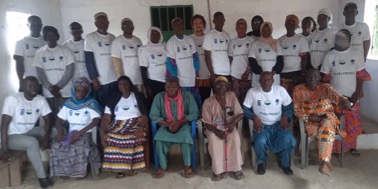
One of the key activities of the UNDP and GEF supported project on Poly Chlorinated Biphenyls (PCBs) and Unintentional Persistent Organic Pollutants (UPOPs) Capacity building project in The Gambia is to create awareness and build capacity of key stakeholders for environmentally sound management of PCBs and their contaminated sites as well as reduce open burning of waste which is a common practice in The Gambia.
For the project to ensure an adequate level of awareness and sustained capacity for the sound management of PCBs, waste management and UPOPs reduction, the project has tailored a six month sensitisation package to suit all communities through Focus Group Discussion and radio phone-in awareness programme throughout all the regions in the country.
In implementing the sensitisation & awareness creation for the month of May, massive and integrated community engagement has been conducted in the communities of Barra/Essau in NBR, Jarumeh Koto village in CRR-s, Diabugu village in URR, Boraba village in CRR-n, Kaiaf village in LRR and Kuloro village in WCR. This local gatherings brought together stakeholders including members of the Village Development Committees (VDCs), district chiefs, alkalolu, women & youth representatives, market committees, chemical dealers, traditional communicators, regional health directorates, CEOs & directors of Planning in Area Councils, NGOs and CBOs.
In recognising the importance of stakeholder participation, community radio talk-shows were conducted in Farafenni, Bansang, Brikamabaa, Soma, Bwiam and GRTS-Basse radio stations.
In his deliberations during these exercises, Muhammed J. Jabang, project coordinator of UPOPs project, disclosed that the consultation meetings and awareness creations are part of the project`s continuous consultations with the grassroots stakeholders on matters relating to sustainable environmental management of the UPOPs project in The Gambia. He added that PCBs and UPOPs adversely affect human health and the environment as they are transported by the agents of wind and water, affecting people, biodiversity and the ecosystem when they are released.
He buttressed that the Stockholm Convention is a legally binding international instrument designed to lead to attain a gradual decrease of POPs in the environment.
He noted that the goal of the NIP updating exercise is to protect human health and the environment from the risks posed by the unsound use, management and releases of POPs. The Convention, he said is a legally binding international instrument, designed to lead to gradual decrease of the presence of persistent organic pollutants in the environment. For The Gambia, he disclosed that PCB management and UPOPs reduction are among the top priorities according to the National Implementation Plan (NIP)
“It has been established that releases of unintentionally produced POPs (UPOPs) are caused through open and uncontrolled burning of waste. Clearly, improper waste management practices, including the burning of landfill sites to reduce waste volumes and the burning of particular wastes by 'scavengers' to reclaim valuable components - such as aluminum, zinc, iron and mainly copper from discarded electrical wires, contributes to these release inventories,” Jabang posited.
He confirmed that Poly Chlorinated Biphenyls (PCBs) are found in electrical transformers that make the National Electricity and Water Company (NAWEC) one of their greatest stakeholders & partners.
Conclusively, he warned that people must be aware of the health concerns resulting from local exposure to Persistent Organic Pollutants and the burning of agricultural wastes that contributes to POPs emissions, air pollution and more generally the loss of carbon from already poor soil.




